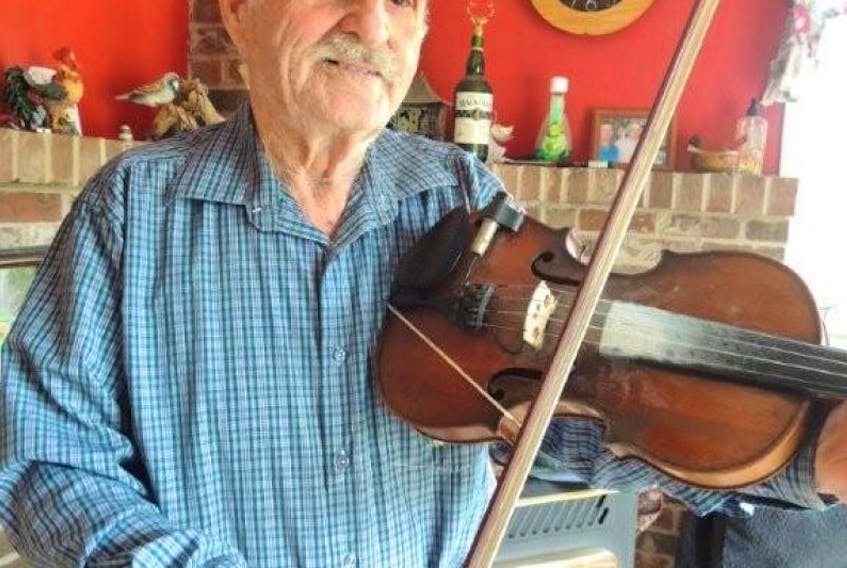SALEM - When Hector MacKenzie returned to Pictou County at the end of the Second World War he set about learning to play the fiddle. Today, at 94, he is part of the Garloch Symphony that has been playing regularly for residents of Glen Haven Manor for more than 30 years.
“That’s Garloch, not Gairloch as they like to spell it today. The old spelling is the right spelling, not what you see on the road signs. Our players were mostly from that area but we didn’t have a name till Danny Munro put that on us many years ago,” he said.
MacKenzie was a teenager when he joined the Army and trained at Aldershot, N.S., but within a short time he and a couple of friends went to Halifax and switched to the Air Force.
“I was sent to Quebec to take a trade and they gave me electrical training. We were trained to go up at night in planes and search for German submarines,” he said.
From Quebec he was sent to Yarmouth to operate aircraft equipment and fly reconnaissance missions.
“The submarines would come up at night to charge their batteries and that is when we had the chance of spotting them. Many people did not believe the Germans had submarines on the east coast until they sunk the Newfoundland ferry,” said MacKenzie.
The SS Caribou, a civilian rail-passenger ferry, was torpedoed by German submarine U-69 and sank in the Cabot Strait in October, 1942, with 137 lives lost.
MacKenzie remembers he and his fellow servicemen clamoured to be on the night flights.
“We were always anxious to go. Every time you went up meant another 75 cents on your pay slip. The more you flew, the better the pay day, but I never spotted a submarine.”
MacKenzie made it home from Quebec several times during the war.
“It was a great time to hitchhike. Nobody would pass a man in uniform. One time I had two cars stop and get in an argument over who was going to take me. Even the Mounties would pick us up.” MacKenzie, who loved his time in Quebec and picked up enough French to get by, was back in St. Hubert’s near Montreal when V-E Day arrived.
“A bunch of us hitchhiked across the border to the States. We were more than welcome at the bars. You couldn’t buy yourself a drink if you wanted to. People were setting us up with drinks every time we turned around and it was the same in every bar.”
There was no difference between a Canadian serviceman and an American that night, he added.
“I woke up the next day in a convalescent hospital where they looked after wounded American servicemen. I guess the party was still going on because there was beer for breakfast,” he laughed.
Once discharged MacKenzie returned to Pictou County hoping to find work.
“I didn’t even have my tunic off when John Proudfoot offered me a job. I worked for Proudfoots for a good many years after that.’’
But it was difficult for a young man who had known the excitement of wartime to settle down.
“It took a while to get used to things again but I started going to the dances. Munro Fraser and his wife would play and, boy, I liked the way he played so I got myself a fiddle. It wasn’t hard to learn because the music was in my head, I just had to figure out how to get it out of the fiddle.”
To this day he plays entirely by ear and cannot read a note of music.
“To me it is just fly shit on paper.”
MacKenzie said his wife Eleanor, whom he married more than 70 years ago, is a pretty good singer but when asked if they ever perform together he said, “We’ve performed together quite a bit, but not musically.”
One of MacKenzie’s most treasured possessions is a fiddle made in New Glasgow by Harold Tully.
“It is a beauty and there’s only seven or eight of them around. I paid $200 for it and I’ve refused $2,000,” he said.
He does not practise but keeps the fiddle ready in case anyone drops in.
“If Frank Hart came through the door we’d be playing in no time. He’s one of our symphony members and a real musician, not like myself.”
Age, to MacKenzie, is just a figure.
“We’re all getting older and we can’t stop so we go on.”
He’d rather focus on the pleasure he and his musical friends bring to Glen Haven.
“When we played Monday night we had a woman get up to dance. What odds if she was hanging onto a chair, she was dancing.”
Rosalie MacEachern is a Stellarton resident and freelance writer who seeks out people who work behind the scenes on hobbies or jobs that they love the most. If you have someone you think should she should profile in an upcoming article, she can be reached at r.[email protected]
SALEM - When Hector MacKenzie returned to Pictou County at the end of the Second World War he set about learning to play the fiddle. Today, at 94, he is part of the Garloch Symphony that has been playing regularly for residents of Glen Haven Manor for more than 30 years.
“That’s Garloch, not Gairloch as they like to spell it today. The old spelling is the right spelling, not what you see on the road signs. Our players were mostly from that area but we didn’t have a name till Danny Munro put that on us many years ago,” he said.
MacKenzie was a teenager when he joined the Army and trained at Aldershot, N.S., but within a short time he and a couple of friends went to Halifax and switched to the Air Force.
“I was sent to Quebec to take a trade and they gave me electrical training. We were trained to go up at night in planes and search for German submarines,” he said.
From Quebec he was sent to Yarmouth to operate aircraft equipment and fly reconnaissance missions.
“The submarines would come up at night to charge their batteries and that is when we had the chance of spotting them. Many people did not believe the Germans had submarines on the east coast until they sunk the Newfoundland ferry,” said MacKenzie.
The SS Caribou, a civilian rail-passenger ferry, was torpedoed by German submarine U-69 and sank in the Cabot Strait in October, 1942, with 137 lives lost.
MacKenzie remembers he and his fellow servicemen clamoured to be on the night flights.
“We were always anxious to go. Every time you went up meant another 75 cents on your pay slip. The more you flew, the better the pay day, but I never spotted a submarine.”
MacKenzie made it home from Quebec several times during the war.
“It was a great time to hitchhike. Nobody would pass a man in uniform. One time I had two cars stop and get in an argument over who was going to take me. Even the Mounties would pick us up.” MacKenzie, who loved his time in Quebec and picked up enough French to get by, was back in St. Hubert’s near Montreal when V-E Day arrived.
“A bunch of us hitchhiked across the border to the States. We were more than welcome at the bars. You couldn’t buy yourself a drink if you wanted to. People were setting us up with drinks every time we turned around and it was the same in every bar.”
There was no difference between a Canadian serviceman and an American that night, he added.
“I woke up the next day in a convalescent hospital where they looked after wounded American servicemen. I guess the party was still going on because there was beer for breakfast,” he laughed.
Once discharged MacKenzie returned to Pictou County hoping to find work.
“I didn’t even have my tunic off when John Proudfoot offered me a job. I worked for Proudfoots for a good many years after that.’’
But it was difficult for a young man who had known the excitement of wartime to settle down.
“It took a while to get used to things again but I started going to the dances. Munro Fraser and his wife would play and, boy, I liked the way he played so I got myself a fiddle. It wasn’t hard to learn because the music was in my head, I just had to figure out how to get it out of the fiddle.”
To this day he plays entirely by ear and cannot read a note of music.
“To me it is just fly shit on paper.”
MacKenzie said his wife Eleanor, whom he married more than 70 years ago, is a pretty good singer but when asked if they ever perform together he said, “We’ve performed together quite a bit, but not musically.”
One of MacKenzie’s most treasured possessions is a fiddle made in New Glasgow by Harold Tully.
“It is a beauty and there’s only seven or eight of them around. I paid $200 for it and I’ve refused $2,000,” he said.
He does not practise but keeps the fiddle ready in case anyone drops in.
“If Frank Hart came through the door we’d be playing in no time. He’s one of our symphony members and a real musician, not like myself.”
Age, to MacKenzie, is just a figure.
“We’re all getting older and we can’t stop so we go on.”
He’d rather focus on the pleasure he and his musical friends bring to Glen Haven.
“When we played Monday night we had a woman get up to dance. What odds if she was hanging onto a chair, she was dancing.”
Rosalie MacEachern is a Stellarton resident and freelance writer who seeks out people who work behind the scenes on hobbies or jobs that they love the most. If you have someone you think should she should profile in an upcoming article, she can be reached at r.[email protected]









